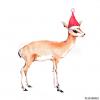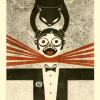The Maths Orgy Thread
-
Yossarian wrote:Is zero an invented number? Is zero a number? Is zero? Is?
https://www.youtube.com/watch?v=9Y7gAzTMdMA"Plus he wore shorts like a total cunt" - Bob -
Octonions!"Sometimes it's better to light a flamethrower than curse the darkness." ― Terry Pratchett
-
 iosGameCentre:T3hDaddy;
iosGameCentre:T3hDaddy;
XBL: MistaTeaTime -
SpaceGazelle wrote:Complex numbers are no more invented than negative numbers.
Heh. Hadn't thought of that.
But then they have more obvious uses since they can imply direction...but I was amazed to hear about complex numbers being able to solve real world problems.Holding the wrong end of the stick since 2009. -
For me zero was all about notation - marking an empty space more than anything else. Just drawing a circle around it. An advance on from roman numerals for example.
But I know there's more to it than that. You have to start somewhere and have a point of reference.Holding the wrong end of the stick since 2009. -
Great video that.
I always though 0-9 came from the Arab world - not India. There ye go. Holding the wrong end of the stick since 2009.
Holding the wrong end of the stick since 2009. -
davyK wrote:I was amazed to hear about complex numbers being able to solve real world problems.
Yeah, it's pretty much the cornerstone of quantum mechanics, and nobody knows why. All maths has application I suppose because the universe is mathematical. An electron for example is nothing more than a set of equations and is completely defined as such."Plus he wore shorts like a total cunt" - Bob -
SpaceGazelle wrote:An electron for example is nothing more than a set of equations
Maths not philosophy pls -
But that's it , isn't it?
How close is pure maths to the actual truth?
We use it to model reality. It's a description of what we observe given a set of conditions , not how actually something works.
But how far down the Russian doll stack will we ever be able to go?
Is it the only tool we have to punch through our layers of perception?
If it isn't we are blind.
And who knows if that would be a good thing or not?Holding the wrong end of the stick since 2009. -
It's not philosophy. There is no 'stuff', which makes it an entirely mathematical phenomena. The philosophy bit is who wrote the equations, and I'm not getting into that."Plus he wore shorts like a total cunt" - Bob
-
Numbers are all invented, it's a pure abstraction. Just it's one so old and so versatlie that it's been used to describe almost everything in (and out) the universe
edit: imo and all that, also didn;t see this page"I spent years thinking Yorke was legit Downs-ish disabled and could only achieve lucidity through song" - Mr B -
So I have a weird mathy' question, couldn't think of how to frame it (because my maths could be better), so I'll just braindump here.
I have a concrete application in mind, but I'll pose the question as an abstract problem...
So... Say I'm catering for a wedding party of 100 guests, but, with me being an absolute sadist, I have 2 menus, and randomly give 30 guests set menu A, and 70 guests set menu B.
I'm doing this to see if putting marijuana in cupcakes is a viable business strategy.
At the end of the wedding reception, I give questionnaires to, I dunno... 40 guests randomly, to ask what they thought of either menu...
What's the likelihood that 12 (30%) of those 40 people did actually receive set menu A?
The one thing I know I can count on, is a somewhat unrepresentative skew, but can I generally count on this being an effective way to see if people like the food?
edit - I suspect this is basically elementary sampling, but I also suspect there's a good formula for actually estimating/predicting the potential quality/reliability of the sample."I didn't get it. BUUUUUUUUUUUT, you fucking do your thing." - Roujin
Ninty Code: SW-7904-0771-0996 -
Ignoring the maths, you’re not going to be able to accurately interpret any of your results.
-
Andy wrote:Ignoring the maths, you’re not going to be able to accurately interpret any of your results.
Assume they were all high before attending, anyway. "I didn't get it. BUUUUUUUUUUUT, you fucking do your thing." - Roujin
"I didn't get it. BUUUUUUUUUUUT, you fucking do your thing." - Roujin
Ninty Code: SW-7904-0771-0996 -
Ok. I'm basically aiming to calculate a confidence interval... I thought there had to be a term for the above."I didn't get it. BUUUUUUUUUUUT, you fucking do your thing." - Roujin
Ninty Code: SW-7904-0771-0996 -
No doubt there's a distribution model that can be used to model that but you would need a statistician to know which one. And your method might need tweaked to match the model more accurately.
The only ones I was aware of at university were the Normal (which is used a lot - hence the name) and the Poisson which is used to model sequences of events to predict when the next event occurs (I think).
But there are pile more - chi-squared is one I remember - I think there's a lot of them that normalise situations so that you can use the Normal. Not sure.Holding the wrong end of the stick since 2009. -
I'm not 100% sure what the question is, but addressing the easy "what's the probability 12 people get menu A" - it's a simple binomial calculation:
40C12 x 0.3^12 x 0.7^28 = 13.66% - assuming that the distribution of both the menus and the questionnaires was random
If you want confidence intervals you can use the general properties of the binomial distribution. The variance of the binomial distribution is
N x P x (1-P)
So 40 x 0.3 x 0.7 = 8.4 in this case.
A 95% probability confidence interval would then broadly be 1.96 x 8.4^0.5 plus or minus the mean, which is something like 6 to 17.
There's all sorts of things you can do with this, but the questions a bit vague so I'm not sure what else you want doing. I'm not going to start getting into censoring and extracting information involving peoples views on either menu because I'd have to actually think about that! -
Heh.....forgot about the Binomial....
 Holding the wrong end of the stick since 2009.
Holding the wrong end of the stick since 2009. -
voices wrote:I'm not 100% sure what the question is, but addressing the easy "what's the probability 12 people get menu A" - it's a simple binomial calculation: 40C12 x 0.3^12 x 0.7^28 = 13.66% - assuming that the distribution of both the menus and the questionnaires was random If you want confidence intervals you can use the general properties of the binomial distribution. The variance of the binomial distribution is N x P x (1-P) So 40 x 0.3 x 0.7 = 8.4 in this case. A 95% probability confidence interval would then broadly be 1.96 x 8.4^0.5 plus or minus the mean, which is something like 6 to 17. There's all sorts of things you can do with this, but the questions a bit vague so I'm not sure what else you want doing. I'm not going to start getting into censoring and extracting information involving peoples views on either menu because I'd have to actually think about that!
That's interesting. That first idea is pretty much completely what I'd originally asked.
So I get what you mean by how muddled the question is.
This though:
voices wrote:...A 95% probability confidence interval would then broadly be 1.96 x 8.4^0.5 plus or minus the mean, which is something like 6 to 17...
Is what I've found since asking the question, and is what I think I'd like to do.
I've been using a tool to calculate it so far, but the formula doesn't look too complicated, so the next step for me, is to break it down, and understand it.
But from what I've learnt so far, if I have 100 people, and feed 30 of them set menu A, and 70 set menu B, if I pick 40 people at random, and 12 of them claim to like the food, then I can be 95% sure that between 18.94 and 41.06(!!?) of the 100 people liked the new menu (A). So even taking the lower number as the estimate on which to base my decision, I can be pretty sure that the new menu was fairly well received.
At least I think that's what I'm looking for.
I'm still open to ideas though.
Cheers for the replies. :]"I didn't get it. BUUUUUUUUUUUT, you fucking do your thing." - Roujin
Ninty Code: SW-7904-0771-0996 -
Ah, no I don't think that's the case. It's difficult to infer how many people liked menu A or B if you don't know which people got menu A and which got menu B. The confidence interval I gave was just the number of people that got each menu, not information about who liked what.
To illustrate, consider the scenario where you ask 40 people, and 12 of them like the food. This could mean:
100% of the people liked menu A, and 0% liked menu B; or
50% of people liked menu A, and 21% of people liked menu B; or
0% of people liked menu A, and 43% of people liked menu B
...or basically any number of other outcomes. That's not even starting with the fact that you can't be sure how many people from each population you've actually surveyed.
Yes - there is a way to get a little bit of info here (like in the example above you could probably infer that it was likely that less than 50% of people liked menu , but if you want to get useful information you need to determine which menu the different people you surveyed got.
, but if you want to get useful information you need to determine which menu the different people you surveyed got. -
In regards to the above, the only thing I think was lost in translation (my maths is that bad - :])
is the fact that I meant that the 12 people in that 40 guest sample did in fact both receive and like menu A (the one that I gave to 30 people in the 100). I fucked that bit up.
The tool that I used to give the figures above ("I can be 95% sure that between 18.94 and 41.06(!!?) of the 100 people liked the new menu (A)"), was this one:
https://www.surveysystem.com/sscalc.htm#one
It's a bit ropey, but I'd been using it to get a rough idea of how the concept works.
I'd been using the second of the two calculators ('sample size', population, percentage), and what I basically did was:
Sample Size = 40
Population = 100
Percentage = 30
Doing that gave me a CI of 11.06
I've since learnt that the calculator is based on some instance of the first equation on this page - https://en.wikipedia.org/wiki/Binomial_proportion_confidence_interval - but the result of that equation doesn't take the original population size into account. The result I got for calculating it by hand is a CI of 14.2 (I think).
So the sentence above changes to:
("I can be 95% sure that between 15.8 and 44.2(!!?) of the 100 people liked the new menu (A)")
I mean, it's a tiny population, and a tiny sample... And to try and understand the idea, I've fudged the perfect result of 12 people in 40 both happening to have received and liked menu A (which I suspect will never happen).
It was your description of the problem as a binomial one that's got me to this point so far (if it's anywhere close to correct, lol!... I can't even post about fucking tofu with 'perfect' competence).
This is essentially a Bernoulli trial, right?"I didn't get it. BUUUUUUUUUUUT, you fucking do your thing." - Roujin
Ninty Code: SW-7904-0771-0996 -
oooh….Bernoulli. Had forgot about that too. I've probably unconsciously wiped all that out of memory. I had no feel for statistics. Something I'd like to go back to though as it was an interesting area.Holding the wrong end of the stick since 2009.
-
https://slate.com/technology/2021/06/golden-ratio-phi-irrational-number-ellenberg-shape.html
interesting article about the golden ratio, or at least interesting for maths thickos like me."Like i said, context is missing."
http://ssgg.uk -
Cool, I’ll give that a read later. Here’s a good one about graphs:
https://www.newyorker.com/magazine/2021/06/21/when-graphs-are-a-matter-of-life-and-deathiosGameCentre:T3hDaddy;
XBL: MistaTeaTime -
I would definitely say 'fie' not 'fee' despite not being in a fraternity
-
The Daddy wrote:Cool, I’ll give that a read later. Here’s a good one about graphs:
https://www.newyorker.com/magazine/2021/06/21/when-graphs-are-a-matter-of-life-and-death
That's a great read, thanks. -
Here's what i assume is a simple maths odds question, but I can't decide the right answer.
the lottery. let's say you play the same numbers each week.
one week, you get a couple of numbers - forget that currently that would get you an extra lucky dip for the next draw.
does that reduce your chances of getting all 6 numbers the following week with the same numbers? and would that carry on effecting your odds into the future?
I've been playing the lottery basically since it's started and using the same 6 numbers, and never had more than 3 numbers...are my chances of winning getting worse each time some of my numbers do come up? or does it being random mean each draw is a completely fresh chance?"Like i said, context is missing."
http://ssgg.uk -
RamSteelwood wrote:does it being random mean each draw is a completely fresh chance?
It means this. -
Yeah each draw is independent of what's gone before, so having got stuff one week doesn't make it more or less likely the next.
It's like tossing a coin. You get a head, the next toss is still 50/50.
(The exceptions to this are eg loaded dice, or eg FA cup draws where balls aren't replaced, etc) -
Gambler’s fallacy init. What’re the chances of that happening? The probability of any set of numbers coming up is completely independent of any previous events. It might look like there’s dependence if you look at the basic probability calcs, E.g P(3) = 1/59. P(3 then 3 again)=1/3481, so it would appear that 3 is less likely the following week because the probability of it happening twice in a row is 1 in 3481, but that’s the same for any combination of 2 numbers, so it’s basically pointless maths.
It’s why people lose lots of money on roulette using systems like the Martingale (keep doubling your stake if you lose).iosGameCentre:T3hDaddy;
XBL: MistaTeaTime
Howdy, Stranger!
It looks like you're new here. If you want to get involved, click one of these buttons!
Categories
- All Discussions2,715
- Games1,879
- Off topic836











